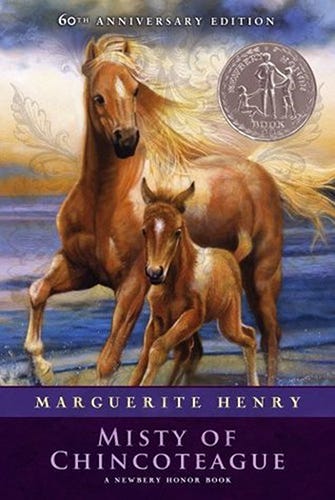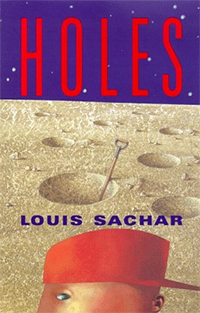
The Whipping Boy by Sid Fleischman. Ages 8 and up. This silly tale tells a story of a mischievous prince and his actions causing turmoil for his whipping boy. The prince and his whipping boy run away and their wild adventures together end up bring them together as friends. The two boys find themselves caught by thieves and they must outwit them to escape.

Sarah, Plain and Tall by Patricia MacLachlan. Ages 4 and up. This book uses simple and descriptive language to describe Sarah and her time spent with her soon to be new family. This book is an easy read for young to older children. Anna and Caleb are eager to show Sarah their home and learn all about her past home in this story. The children make a special bond with Sarah and are happy when she decides to stay with them.

Misty of Chincoteague by Marguerite Henry. Ages 8 and up. I found the accents used by the people in this book were confusing and some of the references were hard to understand. I found that I struggled to get through this book. I kept waiting for the plot to grab my attention, however I felt that the story dragged and I was losing interest.
.jpg/200px-Ella_enchanted_(book_cover).jpg)
Ella Enchanted by Gail Carson Levine. Ages 13 and up. Ella is put under a spell of always being obedient and she must do what others tell her whether it is good or bad. Ella is a genuine and relatable character to a young teenager reading this book. The story will keep you cheering on Ella and hoping that she will be able to undo her spell so she can win her prince charming back. I liked the magical creatures and Ella's interactions with them as she journeyed to try and free herself from the spell.

Holes by Louis Sachar. Ages 10 and up. This book was one of my favorities when I was younger. The story line is funny and unique, making you feel for Stanley and the misfortune that seems to fall onto him and his family. The family likes to blame their misforturne on Stanley's "no good dirty rotten pig stealing great great grandfather." However, as the story unfolds all of the events that took place in the past end up connecting to the present and Stanley's luck turns good.

Number the Stars by Lois Lowry. Ages 9 and up. This book gives you a glimpse of what it was like for Jewish people in Denmark during Nazi occupation in 1943. This story shows the fear and pain that the people of Denmark went through during this time and honors the people who risked their lives to help Jewish people escape the Nazis. The story is told through a ten year old girl's point of view and her determination to help her Jewish friend and her friend's family.

The Midwife's Apprentice by Karen Cushman. Ages 9 and up. I felt that this book was sad and depressing. A girl who decides to name herself Alyce has no family and nowhere to go. She has to constantly struggle by working to get some food for herself. Alyce is hired by a midwife, but the midwife and the village people are cruel to Alyce. The story is about Alyce trying to figure out what she wants with her life to be content. Through her time working as a Midwife's Apprentice, she decides that that is who she wants to be and wants to learn how to one day become a midwife herself.

The Matchlock Gun by Walter D. Edmonds. Ages 8 and up. This short and very detailed book shows a ten year old boy's bravery that rescues his family from Indians. Edward's father goes away and when the Indians arrive at Edward's home he fires his father's Matchlock Gun killing three Indians and scaring the rest away. It is because of his courage that his mother and sister are safe. I feel that as a reader you admire Edward's courage when he fires the gun at the Indians to be able to save his family. I liked how this book used both black and white and colored pictures throughout to give the reader a visual of what was happening.

Room by Emma Donoghue. Grades 11th and 12th. The narrator of this book is a five year old telling the story from his point of view. The language that is used is simple and written as if the five year old was writing the story. I liked that the little boy told the story because it gave me a different perspective of what it must have felt like to be trapped in a tiny room all your life and not know anything different. I sympathized with his character and was happy when he was able to escape the room with his mother, but also understood his confusion as to learning everything about life outside of the room for the first time.
No comments:
Post a Comment